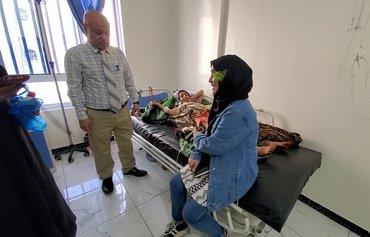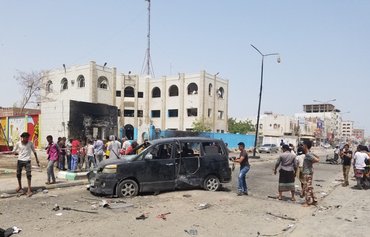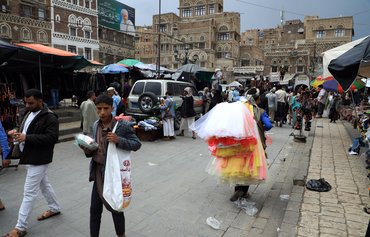The national commission assigned to investigate human rights abuses in Yemen is getting ready to hand over roughly 3,000 completed cases to the judiciary.
During July and August, the commission said, its teams were able to identify 608 cases of human rights violations that had occurred since 2015.
Extremist-affiliated suicide bombers accounted for 12 of those cases. There were 189 cases of disappearances and forceful detentions, and 99 cases of civilian casualties as a result of bombing residential areas.
Other violations included unlawful killings, recruitment of children to serve as fighters, and the bombing of homes and places of worship.
Al-Mashareq met with commission member and human rights activist Ishraq al-Maqtari, who spoke about the commission's work and the challenges it faces.
Al-Mashareq: What are the cumulative results of the commission's work over the past few years?
Ishraq al-Maqtari: According to the commission's periodic report, it was able to identify 17,123 claims of human rights abuses in all Yemeni provinces between September 2016 and July 2017, involving all sides of the armed conflict.
The commission has finished investigating 10,594 claims, and commission monitors and investigators have been conducting field visits in all provinces on a semi-daily basis.
The commission has interviewed 16,191 claimants, victims and witnesses, reviewed thousands of documents, pictures and videos, and conducted several field visits in the different conflict zones.
The commission is currently preparing to hand over 3,000 documented violations to the Attorney General and the chairman of the Supreme Judicial Council, 60% of which are of civilian deaths.
Al-Mashareq: What is the procedure involved in registering these abuses?
Al-Maqtari: Claimants can directly file a report with the commission at its offices in Aden or Taez. They also can sit down with the commission monitors, who are dispatched to different parts of the country.
The commission also receives reports from [human rights] organisations operating in all of Yemen.
However, we primarily rely on our monitors in the provinces and directorates, who go out into the field themselves and meet with the victims, inspect locations, take pictures, document and obtain hospital records and forensic evidence.
Investigators then inspect the legal file and provide a description of every incident. They also conduct field visits and talk to witnesses again.
As a result, the commission now has a current electronic and handwritten database of all incidents perpetrated by all sides of the conflict, including extremist groups.
Al-Mashareq: How does the commission monitor and identify human rights abuses, and will there be legal action taken against the perpetrators?
Al-Maqtari: The commission has issued a statement for the July-August period, which reveals that we have identified more than 600 incidents and finished investigating more than 300 cases of abuse.
The primary role of the commission is to investigate using tools, methods and steps that are semi-legal that it follows by providing a legal description of abuses and identification of the perpetrators.
This is achieved through a set of different mechanisms such as military experts, explosives forensics and inspection of the location where civilians were killed and targeted.
Afterwards, cases are referred to the judicial system to continue with a trial of the charges, which are not subject to a statute of limitations.
Al-Mashareq: What are the main problems and challenges facing the commission?
Al-Maqtari: The problems and challenges facing the commission are the continuation of the war and associated military operations, as well as daily casualties in conflict zones. [...]
Other challenges include the unwillingness of certain sides to co-operate with the commission and the difficulty of reaching victims in areas under their control.
Additionally, the deteriorating condition of public and private institutions in areas of conflict, which are constantly targeted, as well as their meagre resources, make them unable to provide medical documentation and forensic reports.
Other problems facing the commission are that there are different sides responsible for the violations, especially unlawful detentions, torture and displacement [...], not to mention difficulty of movement and access to information, as well as the commission's limited resources.

![Human rights activist Ishraq al-Maqtari conducts a field visit with a team of monitors and specialists investigating human rights abuses in Yemen. [Photo courtesy of Ishraq al-Maqtari]](/cnmi_am/images/2017/09/29/9779-Yemen-human-rights-600_384.jpg)






